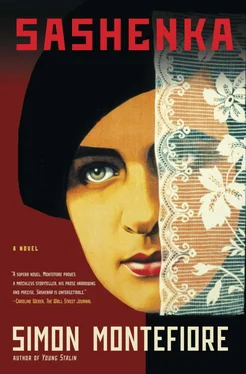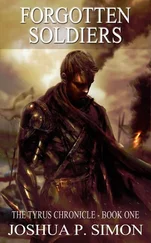She twisted sharply, freed her hands and smacked him in the nose. His blood burst all over her face but his weight held her down. Then she pulled the Walther out of his holster and slammed it sideways into his face. She felt the steel connect with teeth, bone and flesh, and more blood oozed over her fingers.
He rolled off her, and she was on her feet and racing for the door. As she wrenched it open, she glimpsed him curled like a child on the sofa, sobbing.
Sashenka did not stop until she was downstairs and out of the building. She hurtled into a cellar bar full of drunken soldiers but they were shocked by the sight of her and, seizing their bayoneted rifles, offered their help in killing anyone who had laid a finger on her. In the bathroom she washed the blood off her face and buttoned her blouse. The metallic taste of Sagan’s blood was in her mouth, nose, everywhere, and she tried to wash it away but the smell made her gag, and she vomited. When she came out, she took a vodka from one of the soldiers and drank it down. It cleansed her a little, and gradually she felt calmer.
Outside, the streets were still heaving. She heard a burst of shooting on Nevsky. They were lynching pickpockets, and there were drunken gangs of deserters and bandits on the loose. She sensed that Sagan would want to get away from the apartment, so she hid in a doorway and watched the exit from the building. Her head was throbbing, and the lingering taste of his blood made her retch again. Her body was shaking. This had all been for the Party, and now it was over. She told herself that she should feel a sense of triumph—for she had won the Superlative Game, Sagan and his masters were finished, and his attack on her reflected his humiliation. Yet all she could feel was a corrosive shame and a savage fury. She imagined returning with her Party pistol and shooting him as a police spy, but instead, fumbling, she lit up a Crocodile.
About half an hour later, Sagan came out into the street and, in the queer purple light of night, she saw his swollen, bleeding face, his broken gait, how diminished he was. He was just a crooked, lanky figure hunched beneath a high astrakhan hat, his uniform covered by a khaki greatcoat. The streets were seething with huddled men, armed with Berdanas and Mausers, staggering in padded coats. The night was balanced on that thin spine between chanting jubilation and growing ugliness. Sagan headed down Gogol, through the small streets, and across Nevsky. She followed and saw the workers surround him outside the Kazan Cathedral. Perhaps they’d give him a good beating and punish him for hurting her, she thought, but they let him through. Then he tripped on a paving stone and they saw his uniform.
“A gendarme! A pharaoh! Let’s arrest him! Scum! Bastard! We’ll take him to the Soviet! We’ll throw him in the bastion! Here, take this on the smiler, you weasel!” They surrounded him, but he must have drawn his pistol. He got off a shot—there it was, that popping sound again. Then they were kicking at a bundle on the ground, jeering, shouting and raising their rifle butts and bayonets. Breathing raggedly, Sashenka watched it all happen too fast for her really to understand.
Somewhere inside the cacophony of blows and cries, she heard his voice and then the squealing of an animal in pain. The moist thudding of the rifle butts told the rest. Through the workers’ boots and the skirts of their greatcoats, she could see blood glistening on the dark uniform.
She did not see the metamorphosis of a man into a smeared heap on the street—and when it was over, there was a hush after the frenzy, as the crowd cleared their throats, straightened their clothes and then shuffled away. She did not wait any longer. She had seen the power of the people in action—the judgment of history.
Yet she no longer felt as if she had won. A wave of sadness and guilt overwhelmed her, as if her curse had visited this horror upon him. The dead body of Verezin, and now this. Yet this was what she had craved and she must welcome it: the Revolution was a noble master. Many would die in the struggle, she thought—and yet the destruction of a man was a terrible thing.
She found herself leaning on a statue outside the Kazan as tears ran down her face. It was an end but not the one she had wanted. She wished she had never known Sagan and she wished too that he had walked on down that street to a safe exile, far away.
A husky drawl broke the sepulchral hush of the sickroom.
“What’s in the newspaper?” Ariadna asked.
The familiar voice shocked Sashenka. Her mother had not spoken for days. She had just slept, her breathing labored, the infection flourishing in her chest so that it seemed she would never wake again. Sashenka had been reading Pravda , the Party newspaper, when Ariadna stirred. She spoke so clearly that Sashenka dropped the paper, scattering its pages onto the carpet.
“Mama, you gave me a shock!”
“I’m not dead yet, darling…or am I? It stinks in here. I can hardly breathe. What does that newspaper say?”
Sashenka picked up the pages. “Uncle Mendel’s on the Party’s Central Committee. Lenin’s returning any day.” Sashenka looked up to find her mother’s velvety eyes resting on her with an astonishing warmth. It surprised and then embarrassed her.
“When I finally went to your room…,” Ariadna began, and Sashenka strained to understand.
“Mama, you look better.” It was a lie but who tells the truth to the dying? Sashenka wanted to soothe her mother. “You’re getting better. Mama, how do you feel?”
“I feel…” She squeezed her daughter’s hand. Sashenka squeezed back. The eyes dimmed again.
“I long to ask you one question, Mama. Why did you…? Mama?”
At that moment Dr. Gemp, a plump, worldly man with a shiny pink pate and the theatrical air often associated with society doctors, entered the room.
“Did your mother wake up then? What did she say?” he asked. “Ariadna, are you in pain?”
Sashenka watched him lean over her mother, bathing her forehead and neck with a cold compress. He unraveled the dressing on her chest and inspected, cleaned and dabbed the wound, which looked like a congealed fist of blood.
Her father appeared beside her, also leaning over the sickbed. He looked terrible, his collar filthy and the beginnings of a prickly grey beard on his cheeks. He reminded Sashenka of an old Jew from the Pale.
“Is she coming round? Ariadna? Speak to me! I love you, Ariadna!” said Zeitlin. Ariadna opened her eyes. “Ariadna! Why did you harm yourself? Why?”
Behind him stood Ariadna’s parents, Miriam, her small, dry face pointed like that of a field mouse, and the Rabbi of Turbin, with gabardine coat and skullcap, his face framed by his prophetic beard and whimsical ringlets.
“Darling Silberkind,” said Miriam in her strong Polish-Yiddish accent, taking Sashenka’s hands and kissing her shoulder tenderly. But Sashenka sensed how out of place the old couple felt in Ariadna’s room. They had been in there before, yet they peered, like paupers, at the pearls, gowns, tarot cards and potions. For them this was the Temple of the Golden Calf and the very ruin of their dreams as parents.
Dr. Gemp, who specialized in the secret tragedies—abortions, suicides and addictions—of Grand Dukes and counts, stared at the old Jews as if they were lepers, but managed to finish dressing Ariadna’s wound.
Ariadna pointed at her parents. “Are you from Turbin?” she asked them. “I was born in Turbin. Samuil, you must shave…”
Hours, nights, days passed. Sashenka lost track of time as she sat by the bed. Ariadna’s breathing was hoarse and labored, like an old pair of bellows. Her face was grey and sallow and sunken. She had become old, tiny and collapsed. Her jaw hung open, and her chest creaked up and down, catching on clots of phlegm in her lungs so that her breath rattled and crackled. There was no beauty or vivacity left, just this shivering, quivering animal that had once been a vibrant woman, a mother, Sashenka’s mother.
Читать дальше












